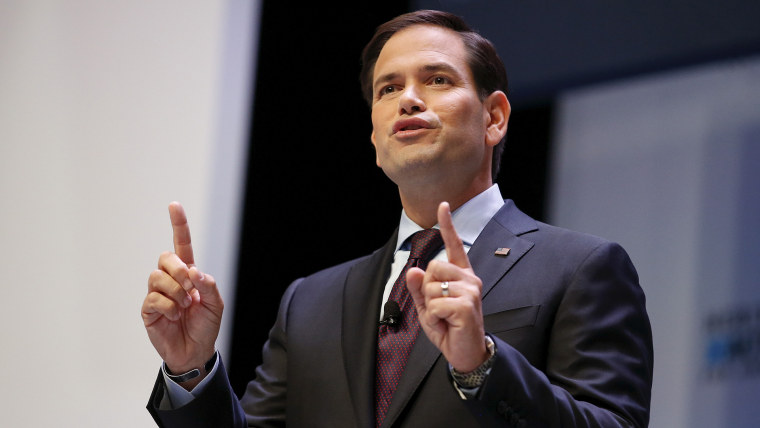Fair-minded news consumers have probably noticed there are some national figures the political media likes, and some the media dislikes. There are, of course, exceptions -- pundits, reporters, anchors, et al, never move in lock step -- but it's generally easy to see who are the favorites based on the tone of the coverage.
Fifteen years ago, for example, the media generally loved John McCain and hated Al Gore. Hillary Clinton has long had a strained relationship with the press, while Paul Ryan has been a media darling.
But the media's affection for Marco Rubio is both undeniable and hard to understand. The partisan senator is almost comically right-wing by American standards, and yet he's nevertheless been celebrated by the mainstream press for years. Time magazine's all-caps "The Republican Savior" headline is hard to forget.
For that matter, I've lost count of how many center-left pundits I know who've argued that Republicans would be foolish to deny Rubio the GOP nomination -- despite their apparent belief that he'd be a terrible president.
With this in mind, it was a little jarring when Rubio went after the media in this week's GOP debate, accusing a newspaper that endorsed him of being "biased" against him, and whining that the political media that's hammered Clinton for years is actually her "super PAC."
Soon after, pundits swooned anyway -- ironically disproving the point -- declaring Rubio the debate's big winner and his party's all-but-certain nominee. There were countless headlines about the senator's upcoming poll surge that hasn't actually happened yet, but which may very well become a self-fulfilling prophecy.
This somehow led the senator to send a letter to supporters again characterizing himself as some kind of victim.
"Last night, in the latest Republican presidential debate, one of the moderators actually asked me if I should "slow down." That's exactly what the establishment has been telling me for years. That I should 'wait my turn.' [...] "I couldn't believe it when one of the moderators misled about my tax plan -- despite having to correct a story earlier this month where he made the exact same claim!"
Oh my.
Look, CNBC's John Harwood didn't mislead anyone about Rubio tax plan. What the journalist said was accurate; what the candidate said was either a lie or evidence of a senator who doesn't understand his own proposal.
As for the "slow down" reference, what CNBC moderator Carl Quintanilla asked was, "[Y]ou're skipping more votes than any senator to run for president. Why not slow down, get a few more things done first or least finish what you start?"
It wasn't a "wait your turn" question; it was a "why don't you accomplish something before seeking the presidency" question.
As for the Republican establishment, has there ever been an instance in which the GOP elite tried to keep Rubio down? Or has someone told the senator there's electoral value in pretending to be a victim?
